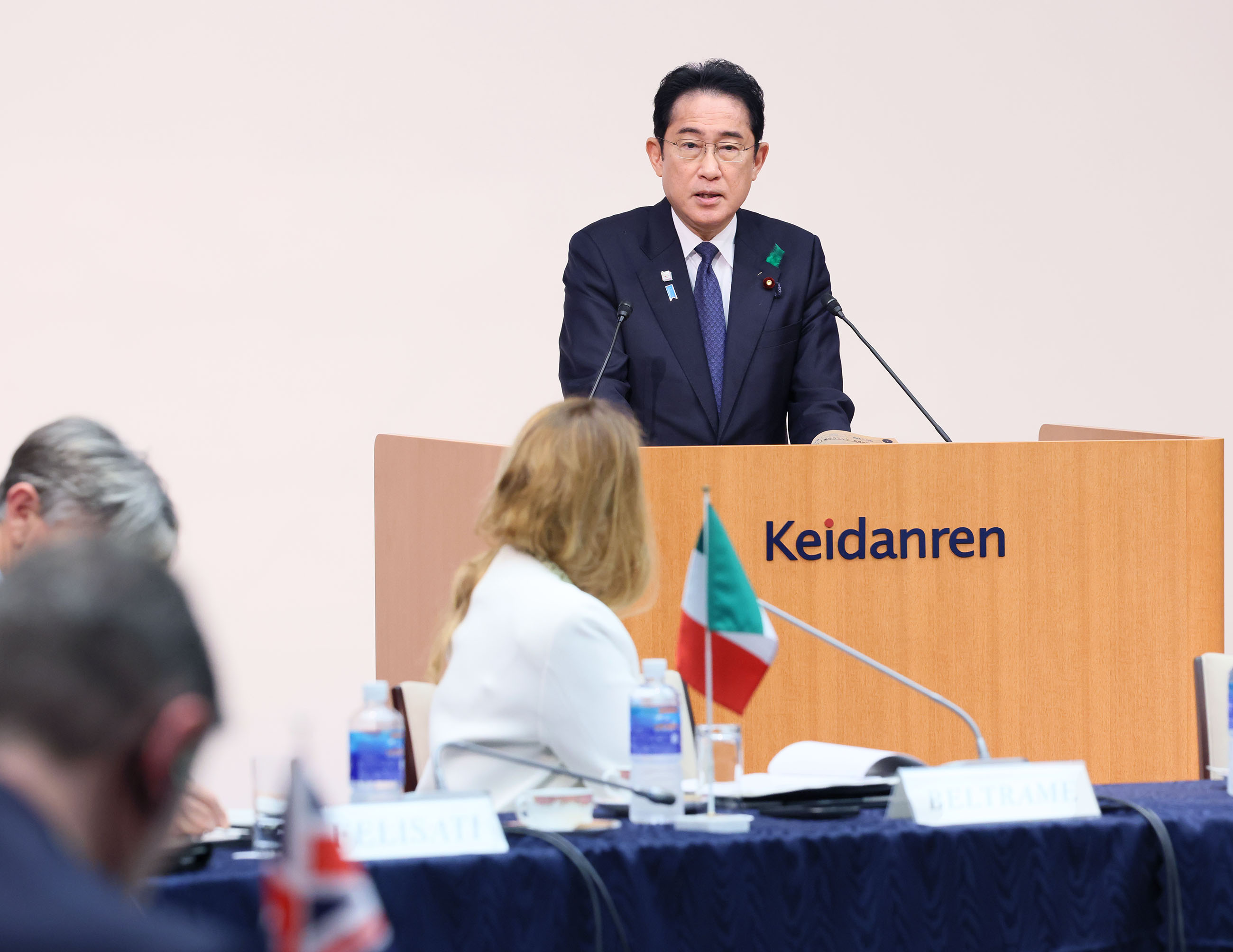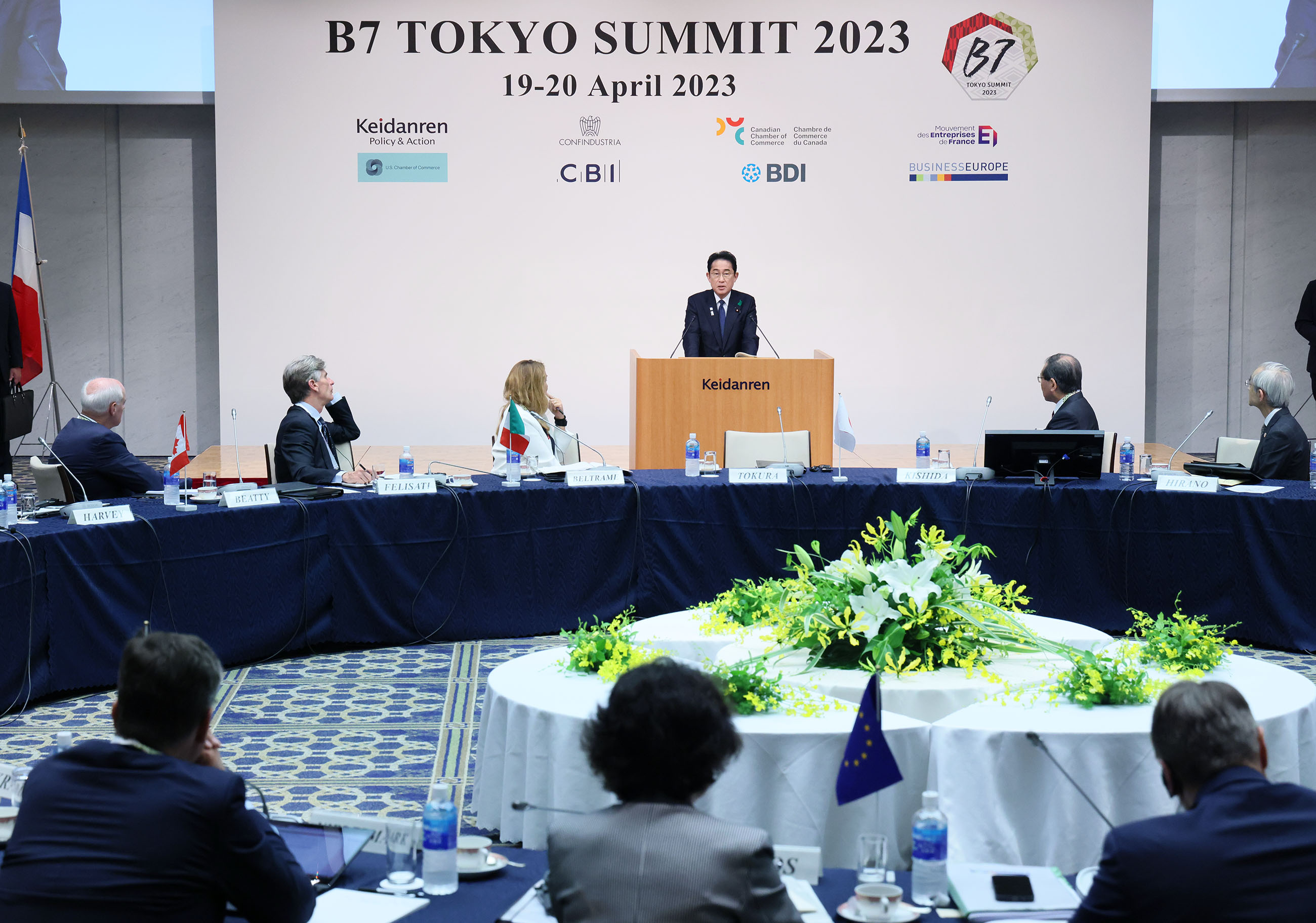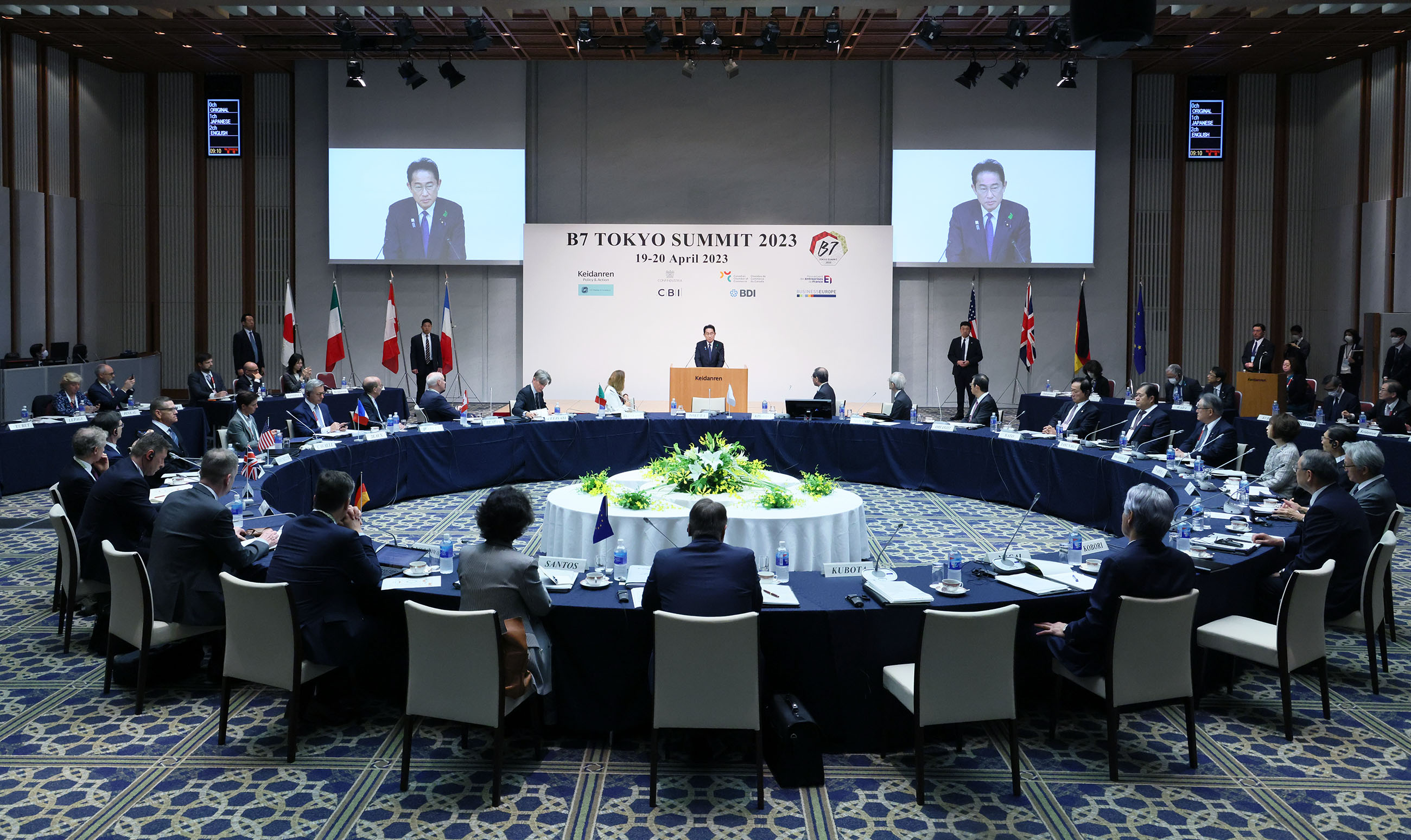Opening Ceremony of the B7 Tokyo Summit 2023
April 20, 2023
[Provisional translation]
On April 20, 2023, Prime Minister Kishida attended the opening ceremony of the B7 Tokyo Summit 2023 held in Tokyo.
Prime Minister Kishida said in his address,
“Ladies and gentlemen, good morning. I am KISHIDA Fumio, Prime Minister of Japan. Thank you very much for inviting me to the B7 Tokyo Summit today. As the Prime Minister of the G7 chair country, I wholeheartedly welcome you, who represent the business community of each G7 country, for visiting Japan.
The international community today is facing an event that is shaking the foundations of the international order: Russia’s invasion of Ukraine. The world is at a historic turning point now. Under these circumstances, G7, which has shared values, bears an extremely grave responsibility. Thus I intend to show the determination, a roadmap, and concrete measures to overcome various challenges posed to the international community in the G7 Hiroshima Summit. In this regard, I put emphasis on the following two perspectives.
The first is to safeguard the free and open international order based on the rule of law, which is a basic principle that governs human society. It is not something that can be evaded by citing differences in values. Unilateral attempts to change the status quo by force and the threat of use of nuclear weapons, as has been made by Russia, let alone their use, are totally unacceptable.
The G7 countries have been united in their response to the Russian aggression against Ukraine. On March 21, I visited Ukraine and Bucha City, where a massacre of citizens reportedly took place, and saw atrocities committed by Russia with my own eyes and ears. In addition, I held a summit meeting with President Zelensky, where I stated that Japan, as the G7 presidency holder, will maintain the unity of the group in its stringent sanctions on Russia and support for Ukraine. President Zelensky and I also confirmed the importance of the private sector in post-war recovery and reconstruction efforts in the country.
The second is to increase engagement with countries collectively called the Global South. The Russian invasion of Ukraine dealt a huge blow to the lives of the people in the world, including developing countries. We cannot build the relationship of trust with them without listening attentively to these countries about their various challenges and addressing these issues. To this end, Japan will host outreach meetings in Hiroshima, inviting not only the leaders of the G7 countries, but also those of eight other countries and seven international organizations.
There are a pile of issues to discuss in the G7 Hiroshima Summit. These include the global economy including energy and food security, the regional situation such as Ukraine and the Indo-Pacific, nuclear disarmament and non-proliferation, economic security, global issues that include climate change, health, and development, gender issues, and response to digitalization.
From the two above-mentioned perspectives, I will hold candid and in-depth discussions with the leaders of the G7 countries on such wide range of issues and demonstrate results.
The outlook for the world economy is uncertain now due mainly to geopolitical risks and surging prices. This is when the G7 must powerfully lead the global economy and spearhead the solution of the issues to achieve lasting growth.
In Japan, I put forward the concept of a new form of capitalism and push ahead with efforts such as digital transformation, green transformation, promotion of innovation, and development of start-ups, while placing emphasis on investments in people, toward the promotion of a virtuous cycle of growth and distribution. Developed countries are also facing issues such as securing stable energy supply, building resilient supply chains, and climate change, with a great trend of stimulating investments in these social issues under public-private collaboration.
I would like to deepen discussions on the importance of collaborative efforts between the public and private sectors and international collaboration toward solving these social challenges and lead lasting growth.
The Global South countries now need investments and private capital in a wide range of fields such as infrastructure, climate change and energy, health, and other issues and toward the achievement of the Sustainable Development Goals. I would like to hold deep discussions among the G7 countries on measures to that end.
In this context, let me introduce Japan’s initiatives. I announced a New Plan for a “Free and Open Indo-Pacific (FOIP)” the other day. With the goal of leading the international community in the direction of cooperation, rather than division and confrontation, Japan will enhance cooperation for FOIP. We will also introduce new private capital mobilization-type Official Development Assistance (ODA) that will attract investments and make an amendment to the Japan Bank for International Cooperation (JBIC) Law that will lead to further mobilization of private capital, so that we can generate public-private synergy effects. Japan will mobilize a total of at least USD 75 billion in public and private funds in the Indo-Pacific region by 2030 in infrastructure, for which demand is especially high, and will grow together with other countries.
While I am aware that the promotion of cooperation with the Global South as a major issue on the agenda in today’s B7 Tokyo Summit, the G7 as a whole intends to support the Global South under public-private collaboration.
Now I move on to climate change and energy. As Russia’s aggression on Ukraine has led us to reaffirm the importance of ensuring energy security, we remain unchanged in our goal of achieving net-zero emissions by 2050. We need to show a path toward a resilient energy transition that is tailored to circumstances of each country and region.
In the G7 Hiroshima Summit, Japan would like to focus on the following three points: the progress in the implementation of global decarbonization, support to protect people vulnerable to climate change both in terms of quality and quantity, and initiatives toward the goal of net-zero emissions by 2050 while ensuring energy security.
I also would like to mention trade and economic security. The foundations for our economic prosperity today are a free and fair multilateral trade system. Japan will begin with reaffirming its importance in the G7 Hiroshima Summit.
On the other hand, as the world is currently tackling crises such as the pandemic and Russia’s invasion on Ukraine, the resilience of our economy is being tested. The world must prepare itself for economic security risks, including the supply disruption of importance resources and vulnerabilities inherent in interdependent economic relations.
In the G7 Hiroshima Summit, Japan intends to hold candid discussions at the leader level on such issues as building resilience of supply chains and critical infrastructure and responses to non-market policies and practices and economic coercion.
Let me take this opportunity to talk about the Japanese economy as well.
The Kishida government will actively attract human resources and capital from overseas, expand investments in Japan as a whole, enhance its innovation capacity, and increase new business opportunities from abroad, thereby translating them into further economic growth of the country.
To this end, we will announce an action plan with new numerical targets as early as this month. This plan will include measures to promote investments to establish resilient supply chains in strategic areas such as semiconductors, a strategy to build Asia’s largest start-up hub, and the establishment of a high-level resident status system that will make it easier for overseas talents to work in Japan. We will make Japan a country that is more open to the world by putting this into practice. I ask for your investments in Japan.
I would like to conclude by offering a few words on my expectations for the B7.
Defending the prosperity of the global economy as well as underlying peace and security of the international community is G7’s mission. In the upcoming Hiroshima Summit, I am determined to fulfill this mission earnestly.
In doing so, gaining viewpoints of members of the business community is extremely important. Today I have high hopes that there will be a whole day of lively exchanges of views on challenges facing the world and how governments and business communities can work together.
Thank you very much for your kind attention.”



